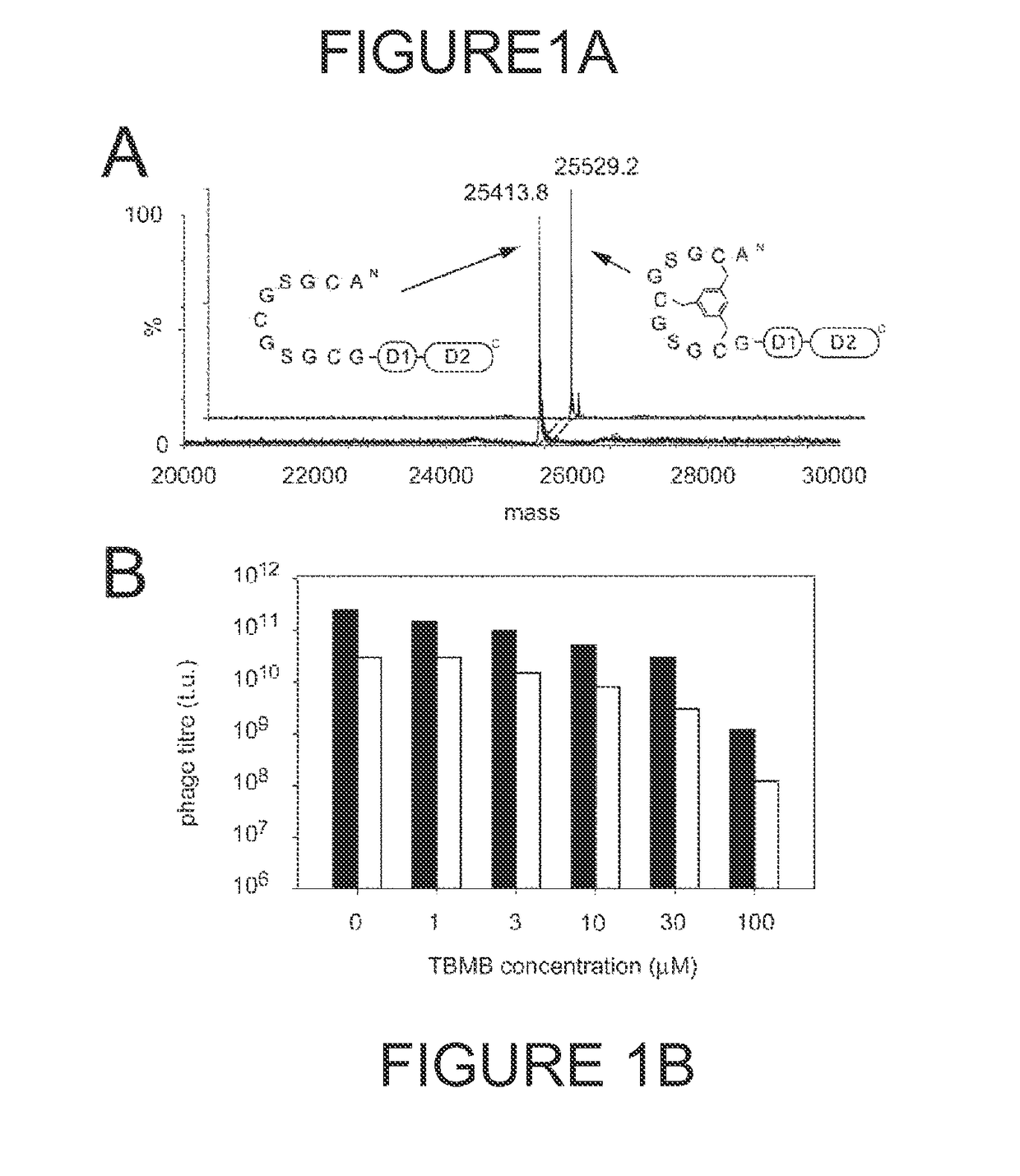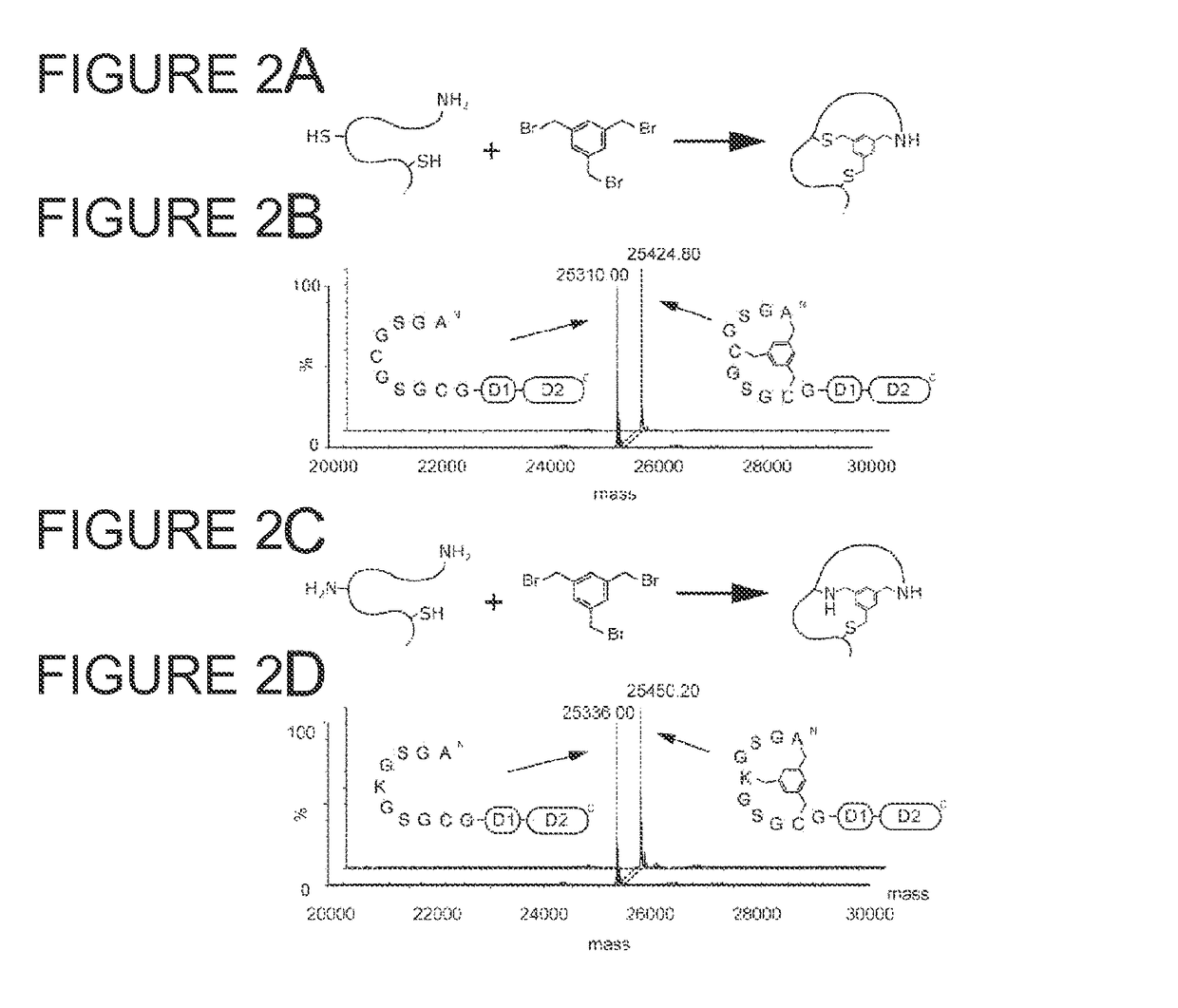Modification of polypeptides
a technology of polypeptides and ligands, applied in the field of polypeptide ligand production methods, can solve the problems of reduced conformational flexibility of cyclic structures and low efficiency, and achieve the effects of enhancing cell penetration, convenient attachment to biomolecules, and efficient transpor
- Summary
- Abstract
- Description
- Claims
- Application Information
AI Technical Summary
Benefits of technology
Problems solved by technology
Method used
Image
Examples
example 2
[0225]Comparison of Wild Type Tet and Schmid Phage During Modification
[0226]The effect of the TCEP and TBMB modification process on phage infectivity was studied using wild-type (WT) FdTet compared to the mutated Schmid phage, which is disulphide-free. It is believed that Schmid generally has a lower titre, but may be more resistant to chemical modification.
[0227]The following phage were tested:[0228]PEP48 peptide in WT FdTet, obtained from S. Luzi (LMB, Cambridge)[0229]PEP48 peptide in Schmid phage obtained from S. Luzi[0230]PK15 in WT FdTet from Edward Walker (Bicycle Therapeutics, Cambridge)
[0231]PEP48 and PK15 are two different peptides containing three cysteine residues each. PK15 is specific for kallikrein; PEP48 is specific for mdm2. See European patent Application EP2464727.
[0232]Glycerol stocks of these phage were streaked onto tetracycline plates (WT tetracycline (tet) constructs) or chloramphenicol (chlor) plates (Schmid construct).
[0233]A single colony of each construct ...
example 3
Modification of Phage on Resin
[0290]PK15 is a three cysteines containing peptide (H-ACSDRFRNCPADEALCG-NH2) (SEQ ID NO: 18), which when coupled with TBMB, is a specific and potent inhibitor of human plasma kallikrein. This peptide can be displayed as a fusion to gene 3 protein of phage and if correctly modified by TBMB will result in a phage that can specifically bind to kallikrein. Non-modification of PK15 on the phage or cross-linking of the phage would not result in a specific binding signal for the phage binding to kallikrein.
[0291]Anion exchange resin was used to capture the phage, allowing for quick and easy changing of the buffers that the phage were exposed to during the modification process. The phage were also titered for particle number and infectivity to show that the modification process had not made the phage significantly less infectious.
Materials and Methods
[0292]1. 1 ml of 1M NaHCO3 was added to either 50 μl, 100 μl or 150 μl of an approximately 50% slurry of a stron...
example 4
Polypeptide Modification on Phage Using Magnetic Separation
[0309]The use of a magnetic separation station for the isolation of phage displaying polypeptides is described. In addition, in the present example, the effect of:[0310]Different binding buffers (i.e. phage input solution)[0311]Different binding / wash buffers (i.e. buffer during modification)[0312]Different elution buffers
on the efficiency and yield of the magnetic TCEP / TBMB modification process is reviewed. The polypeptide used was PK15, displayed on wild-type FdTet.
Materials and Methods
[0313]A colony from E. coli containing PK15 / WT FdTet which had been freshly streaked on an agar plate was used to inoculate 25 ml of either 2TY / tet or LB / tet, and cultures were incubated overnight at 37 C shaking 250 rpm.
[0314]The following solutions were prepared:
[0315]Elution Buffers:
[0316]Citrate solution=100 mM (2×)→pH2.0 (without adjustment)
[0317]20 ml portions of the 100 mM citrate buffer were diluted 1-in-2 with water, then pH-adjusted...
PUM
 Login to View More
Login to View More Abstract
Description
Claims
Application Information
 Login to View More
Login to View More - R&D
- Intellectual Property
- Life Sciences
- Materials
- Tech Scout
- Unparalleled Data Quality
- Higher Quality Content
- 60% Fewer Hallucinations
Browse by: Latest US Patents, China's latest patents, Technical Efficacy Thesaurus, Application Domain, Technology Topic, Popular Technical Reports.
© 2025 PatSnap. All rights reserved.Legal|Privacy policy|Modern Slavery Act Transparency Statement|Sitemap|About US| Contact US: help@patsnap.com



